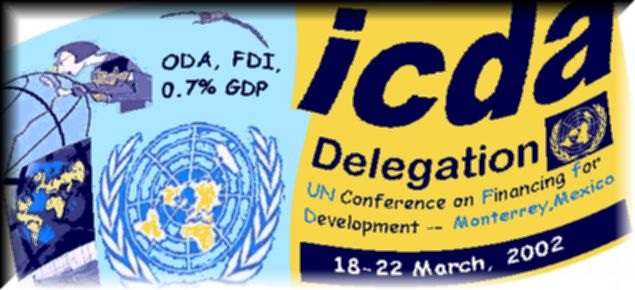
| ICDA LATEST |
ICDA Latest News
| ICDA MEMBERS |
Current Members
| WTO IMPACT LIST |
Subscribe Here
 Talk about the WTOIL!
Talk about the WTOIL!
Password Protected!!
| CENNT |
Latest News
IWGGT (under construction)
| PUBLICATIONS |
Latest ICDA Journal (in construction)
| VACANCIES |
Internship
| HELP |
FAQ's
| SURVEY |

|
Published: Monday 18 March 2002 @ 1:04pm CET
Romanticising the Rhetoric of Development By Emmanuel.K.Bensah ICDA Secretariat, Brussels 18 March, 2002 The United Nations International Conference on Financing for Development kicks off March 18 in Monterrey, Mexico. The challenges to be tackled at this conference are, according to the Brussels-based development NGO, CIDSE, as "fundamental development challenges: how to mobilise domestic and international resources for development, including foreign direct investment [FDI], how to improve the development impact of debt restructuring, ODA [Overseas Development Assistance] and trade policy." The aims are further enumerated as "including a better global governance and financial architecture reform." To the outsider, the problem with this conference is that it can potentially be - again - only about words. UN Conferences are generally perceived as glib affairs where rhetoric is romanced to death. Small wonder, then, that it is the extent to which participants can come out of this conference with something concrete in their hands that remains to be seen. If the current events in Argentina, and the events of September 11 have taught us anything, it is that nothing is as black and white as it appears to be. Also, there should there be no room for complacency, either among the developing countries, or the developed ones, that aid is sufficient to lift the 600 million people, living on a dollar-a-day statistics, out of their plight. Perhaps this is the reason why this UN conference will be held at what the report calls "the highest political level", rather than the ministerial level, so that it can offer a more holistic approach to the objectives that have been set ahead. What is also interesting about this conference is the way in which the main multilateral institutions - or what Swedish Ambassador to the UN, Ruth Jacoby, called at an interactive Teleconference held in Brussels on March 14, as "stakeholders" - have been asked to co-operate. Of these, the most notable are the WTO, UNCTAD, IMF, and World Bank that have been asked to provide an input so as to "adopt a concrete and precise plan of action for the international community". The agenda for the conference is very comprehensive, with decisions to schedule discussions on "mobilising domestic financial resources for development; mobilising international resources for development; trade; increasing international financial co-operation for development; debt; and addressing systemic issues". If this may sound too bombastic, or pompous, for the untrained, it appears it is this jargon that is ostensibly setting the tone for international civil society to engage with politicians more easily. That said, the implementation of these six key suggestions for financing the commitments agreed at major conferences - as this is what they essentially are - will be far from easy, especially now at this strange time after September 11 when the US appears to be increasingly going towards a unilateral stance. Furthermore, there is the key issue of meeting the 2015 targets set by the UN to halve poverty. Also, the extent to which this conference can become a conduit by which the next UN conferences in June (FAO World Food Summit) and August (World Summit on Sustainable Development) can feed into the Millennium Development Goals (MDG) remains to be seen. UN secretary-general. Kofi Annan admonished that very good speeches, with targets set, at the Millennium Declaration notwithstanding, the 2015 targets cannot be achieved "unless there is real development throughout the world, especially in the poorest countries." He maintained that development "cannot happen without resources, especially financial resources." Perhaps, Civil Society would do best to heed Executive Co-ordinator of the UN Secretariat on Financing for Development Oscar Rojas' remonstrations to participate in as many discussions as possible. [ENDS]
This article was based on ICDA's SOD Report 5.5 of November 2001. |
|
*Please note that Page Updates are page-specific, which means that the whole site is not updated at once. You will therefore find that some pages have different dates of update.*
Copyright ©E.K.BENSAH II PRODUCTIONS. 1998-2003
| ICDA is a |
ICDA was established on December 20, 1977. It is registered in the Netherlands, with registration n#:41198114 |